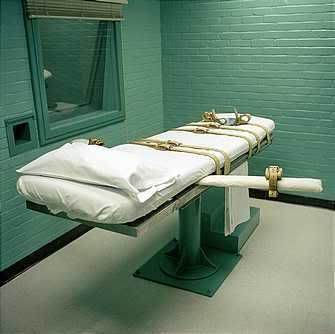Today the New England Journal of Medicine has an editorial entitled, “Physicians And Execution.” The editorial makes it clear that medical doctors should never be involved in state killing.
This is extremely important and another significant step toward the abolition of state killing. How so? “Lethal injection” was introduced to “medicalize” and lend moral authority to executions when hanging, gassing, and electrocution were finally recognized to be inhumane. That is why those to be executed are required to lie on hospital like gurney (see above). And that is why the gurney has sheets on it. That is why in many cases hospital like curtains are used to surround the dead person after the execution. The “medical” appearance of killing is intended to make it more palatable.
More after the jump.
The entire editorial is important and well worth reading. Here are significant excepts:
Lethal injection was introduced in the United States in 1977 explicitly to sanitize executions, since the older methods – hanging, electrocution, and chemical gassing – were considered to be inhumane. The three-drug regimen that is commonly used was proposed by an Oklahoma forensic pathologist, Dr. A. Jay Chapman, and adopted by the state legislature without any scientific or medical testing. Injected drugs, now used in all but 1 of the 37 states in which capital punishment is legal, have been part of the increasing medicalization of executions and the enlistment of medical personnel to lend them apparent moral legitimacy.
Since 1977 the Oklahoma regimen has been used in approximately 900 executions, several dozen of which have been botched because of infiltration of intravenous lines, inadequate anesthesia, drug precipitation when solutions of sodium thiopental and pancuronium bromide are mixed, and other problems. In a vivid example, an inmate in Ohio in 2006 raised his head repeatedly during the execution and said, “It don’t work.”
As a consequence of botched executions, the assistance of physicians and other health care professionals has increasingly been sought to provide consultation, place intravenous lines, mix and administer drugs, and monitor the results. This fact is not widely appreciated because such physicians often choose to remain anonymous. Still, many physicians and medical societies, including the American Medical Association and the American Society of Anesthesiology, have taken strong stands against the involvement of medical professionals in capital punishment. Although some states have forbidden medical boards to reprimand physicians who participate in executions, few medical professionals have agreed to assist in lethal injection. For example, in response to a federal court order in 2006, the State of California required the presence of qualified medical personnel at the execution of Michael Morales. Prison officials found two anesthesiologists who were willing to participate, but when informed in detail of the role they would play, they withdrew hours before the scheduled lethal injection, which was then halted.
We are concerned that, regardless of its decision in Baze v. Rees, the Court may include language in its opinion that will turn again to the medical profession to legitimize a form of lethal injection that, meeting an appropriate constitutional standard, will not be considered “cruel and unusual punishment.” On the surface, lethal injection is a deceptively simple procedure, but its practical application has been fraught with numerous technical difficulties. Without the involvement of physicians and other medical professionals with special training in the use of anesthetic drugs and related agents, it is unlikely that lethal injection will ever meet a constitutional standard of decency. But do we as a society want the nation’s physicians to do this? We believe not.
Physicians and other health care providers should not be involved in capital punishment, even in an advisory capacity. A profession dedicated to healing the sick has no place in the process of execution. On January 7 in oral arguments in Baze v. Rees, the justices asked many important and thoughtful questions about a potential role for physicians and other health care professionals in executions. In their fuller examination of Baze v. Rees, the justices should not presume that the medical profession will be available to assist in the taking of human lives. We believe that, like the anesthesiologists in the Morales case, all responsible members of the medical profession, when asked to assist in a state-ordered execution, will remember the Hippocratic Oath and refuse to participate. The future of capital punishment in the United States will be up to the justices, but the involvement of physicians in executions will be up to the medical profession.
These are important words and they lead directly to abolition. h/t to Jeralyn at Talk Left.


12 comments
Skip to comment form
Author
Also available, despite my misgivings, in orange.
…doctors aren’t the only ones who shouldn’t be involved in executions. None of us should.
Thanks, davidseth, for giving this some attention.
certainly, doctors can refuse assisting in state-ordered executions… chilling isn’t it. the only bright light in the last years is New Jersey ending state-ordered murder.
btw, i’m sure those pharmacists would applaud those doctors… right to life and all.
should not be involved in executions.
Too…
For the prisoner that is. Making a murderer spend the rest of his natural life in solitary seems to me a much more arduous path than getting to close out the chapter before the book is done. With, perhaps someone talking to them about what they had done, to keep them focused.
I’m glad to see them weighing in on this issue.
the death penalty is immoral and impractical. it’s bad enough that innocent people end up on death row, but the process is costly and doesn’t create an ounce of deterrence.
I wonder how long it’ll take before we get to abolition. ever?